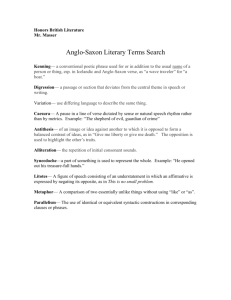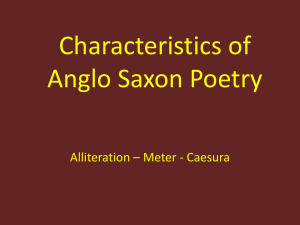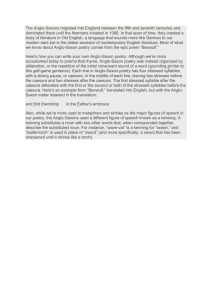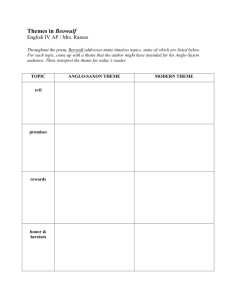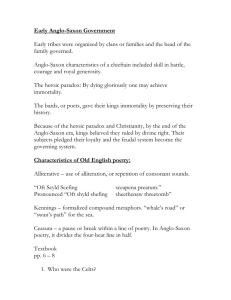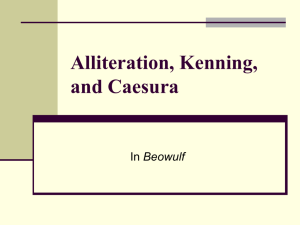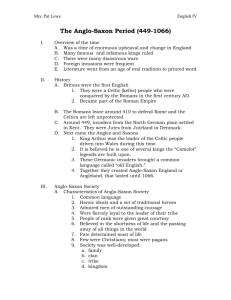File
advertisement
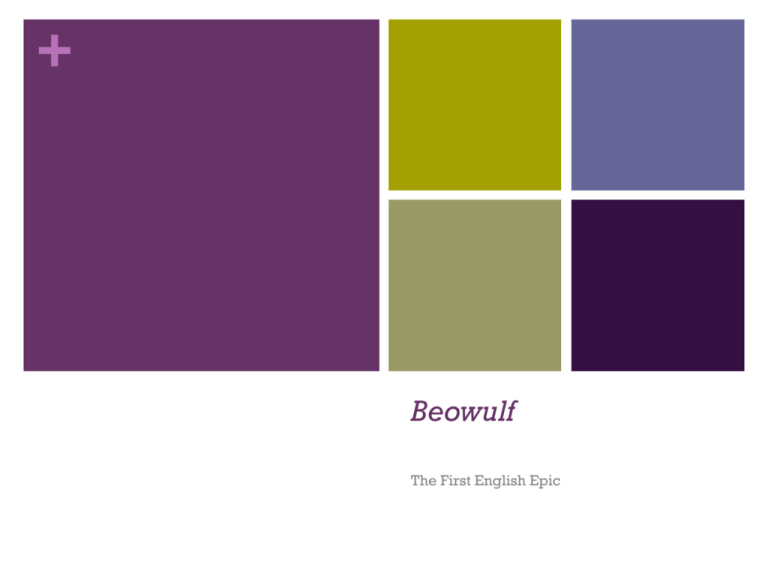
+ Beowulf The First English Epic + TSW… Analyze Beowulf, an Anglo-Saxon poem, for its influence on English Literature and importance to the Anglo-Saxons. + Standards + Agenda 1. Bellwork – Write your definition of a hero on a piece of paper with an example. 2. Lecture – Anglo-Saxon History/Background 3. Lord’s Prayer in Old English 4. Exit Ticket – Pop Quiz + Opening scene from Beowulf First 5 minutes. Questions: 1. What did the scene look like? (visual) 2. Who do you think Hrothgar was? Justify. 3. What do you think will happen? + Anglo-Saxon History/Background Why study? The U.S. cultural heritage has been profoundly influenced by English Literature, Language, and Law. + Invasions British Isles Romans Angles & Saxons Vikings Normans th Century B.C. The Celts – 4 + •tall, blonde warriors •Sometimes called “Britons” •Religion: •Pagans – worshipped spirits (everywhere – trees, water, stones, nature, etc.) •Druids=priests •Performed animal & human sacrifices + The Celts Celtic legends Values important Stories full of: 1. 2. 3. Strong women Magic Imagination + Anglo-Saxon History – Invasion! Roman invasion and settlement. Ca. 50 A.D. •100 years for Romans to conquer Celts •Several hundred years rule •Brought some Christianity •Built roads, Hadrian’s Wall. •Left no government. Hadrian’s Wall + Anglo-Saxon History – Invasion! Angles and Saxons and Jutes Series of invasions Drove out Celts Language became dominant Renamed Engla-land = England + Anglo-Saxon History Anglo-Saxon Life/Religion Close allegiances between leaders and followers Leaders earned positions Earned fame through war Religion gods for warriors - polytheism Odin (father), Thor (son) Encouraged ethics & qualities like: Bravery 2. Friendship 3. Loyalty Death, poetry, magic were important parts of society. 1. + Viking Invasion - Christianity and King Alfred Christian missionaries sent from Rome and Ireland at same time of Viking raids. 3 EFFECTs: 1. Britain linked culturally to Europe (think Roman Catholic Church) 2. Provided common faith & system of morality 3. Helped King Alfred unify A-S against Viking invaders. Fierce Viking invasions in 8th and 9th centuries. Alfred the Great brought A-S together to protect: Culture Churches People Vikings continued to invade until A-S & Vikings were overthrown by William Conqueror in 1066 (Normans). + King Alfred Promoted learning Anglo-Saxon Chronicle – running history of England written in Old English (OE), not Latin. First time that OE had been promoted. Monasteries – fostered learning & preserved literature Copied Latin & Greek classics and works of OE, like Beowulf + English – An evolving language https://www.youtube.com/watch?v=av-37L0G8lw Paired activity: 1.What language (if any) does it sound like? 2.Could you pick out anything familiar? What? 3.Why do think the language changed? 4.Do you think language changes today? Justify your answer. + Old English – The Lord's Prayer Old English Fæderureþuþeeart on heofonum; Si þinnamagehalgod to becumeþin rice gewurþeðinwilla on eorðanswaswa on heofonum. urnegedæghwamlicanhlafsyle us todæg and forgyf us uregyltas swaswa we forgyfaðurumgyltendum sinnedagainst-us and ne gelædþu us on costnunge ac alys us of yfelesoþlice Literal Translation Father our thou that art in heavens be thy name hallowed come thy kingdom be-done thy will on earth as in heavens our daily bread give us today and forgive us our sins as we forgive those-who-haveand not lead thou us into temptation but deliver us from evil. truly. + Exit Ticket – Anglo-Saxons Quiz Using notes from today, answer in COMPLETE SENTENCES: 1. Name 3 peoples other than the Angles and Saxons who invaded Great Britain during this time. 2. Name at least two things King Alfred did to unify the Anglo-Saxons. 3. What is a BARD and why were they valued during this era? 4. Generally, how were women treated in Anglo-Saxon society? + Beowulf Day 2 - Agenda 1. Bellwork – read pages 18-20 in your Literature book. Define epic and epic hero in your notes. 2. Discuss epic and epic hero. 3. Pronunciation guide. 4. Beowulf Parts 1-3. 5. Reflection. – Student summary + Handout Parts 1-3 We will read this portion together and answer the questions. Always follow along in the book. Be prepared to answer questions. + Beowulf – Day 3 The Beauty of Anglo-Saxon Poetry 1. Bellwork – on an index card, write down some conventions of modern poetry that you remember (i.e. figurative language, sound devices, meter, types of poetry) 2. Audio Clip, Anglo-Saxon Poetry 3. Notes – Kenning, Caesura, Alliteration 4. Analyze Anglo-Saxon Riddles 5. Gallery Walk 6. Independent practice 7. Exit Ticket/Reflection + Essential Questions – Day 2 1. 2. What can we learn from the manuscripts and literature of the AngloSaxons? What are some of the formal elements of AngloSaxon poetry? + Audio Clip – Old English Audio Clip – Riddle 45 in Old English, Swarthmore College 1.Are you able to recognize any words this time? Why or why not? 2.Did you notice any kind of rhythm to the poetry? Was it regular or sporadic? + Connections Just like modern poets, the AngloSaxon bards (scops) used alliteration and other sound devices to make their poetry more pleasing to their listeners. In fact, this is probably why we use these conventions today. + Notes – Conventions of AngloSaxon Poetry 1. Kenning 2. Caesura 3. Alliteration + Notes = Kennings Kennings – special metaphor made of compound words. A favorite of Anglo-Saxon bards. Beowulf contains over 1,000 kennings (original). Earliest and simplest: “sky-candle” = sun “battle-dew” = blood “whale-road” = sea More elaborate: “foamy-throated sea-stallion” or “foamythroated sea stallion of the whale-road” = ship Modern-day kennings: “gas guzzler,” “headhunter,” “queen bee,” “king of the hill” + Well-known Anglo-Saxon kennings: Bone-house =The human Battle-light body =Sword Wave-floater =Ship Fish-home =Sea Seal bath =Sea + Alliteration Alliteration is the repetition of consonant sounds in words that are close to one another. Alliteration may occur at the beginnings of words, as in “bright blue” or “kindcomment” within words, as in “jacket pocket” + Alliterative Anglo-Saxons Instead of rhymes, Anglo-Saxon oral poets used alliteration along with carefully placed pauses to add music and rhythm to their poems. Lines of Anglo-Saxon verse often are divided into two halves separated by a rhythmic pause, or caesura. ða com of more under misthleoþum Grendelgongan, godesyrrebær; myntese manscaða manna cynnes sumnebesyrwan in seleþamhean. + Alliterative Anglo-Saxon Here are the same lines in Burton Raffel’s modern translation: Out from the marsh, from the foot of misty Hills and bogs, bearing God’s hatred, Grendelcame, hoping to kill Anyone he could trap on this trip to high Herot Punctuation produces pause effect of the caesura. + Why use these conventions? Anglo-Saxon poets and storytellers used alliteration and kennings because these devices •aided memory •created sound effects •pleased the audience + Let’s analyze this riddle (#40) I saw four things, in beautiful fashion Journeying together. Dark were their tracks, The path very black. Swift was its moving, Faster than birds, it flew through the air, Dove under the wave. Labored unresting The fighting warrior, who showed them the way All of the four, over plated gold Can you solve the riddle? + Gallery Walk 1. Groups of 3 2. Identify kenning, alliteration, and caesura. 3. Solve the riddle, explain your reasoning. 4. When your group is finished, pick up a handout and begin working on the independent practice. 5. When all groups are finished, we will walk around looking at the riddles. 6. Use a sticky note to make comments/corrections on other groups’ + Exit Ticket/Reflection 1. Rate your learning today 1-5. 1= “I do not understand”, 3=“I understand, but couldn’t explain it”, 5=“I understand completely and could explain it to someone else.” Answer the essential questions on your index card: 1. What can we learn from the manuscripts and literature of the Anglo-Saxons? 2. What are some of the formal elements of Anglo-Saxon poetry?

